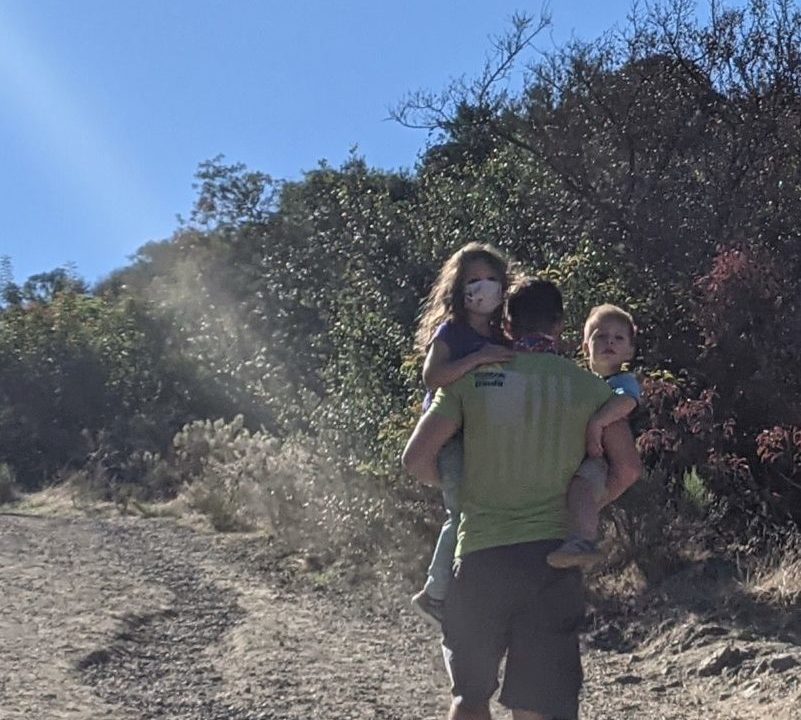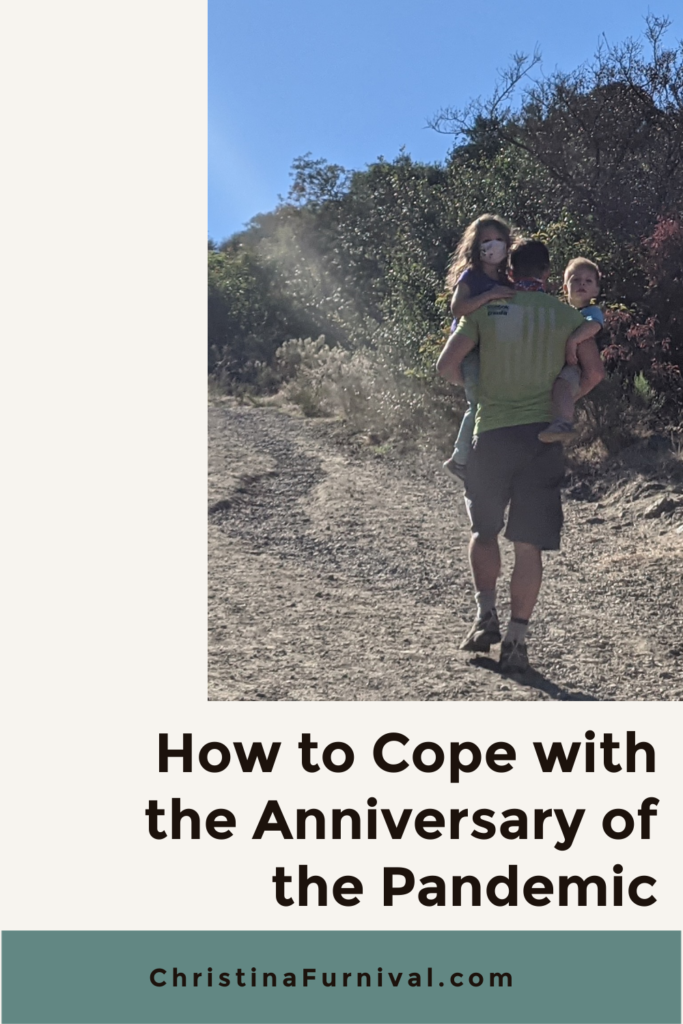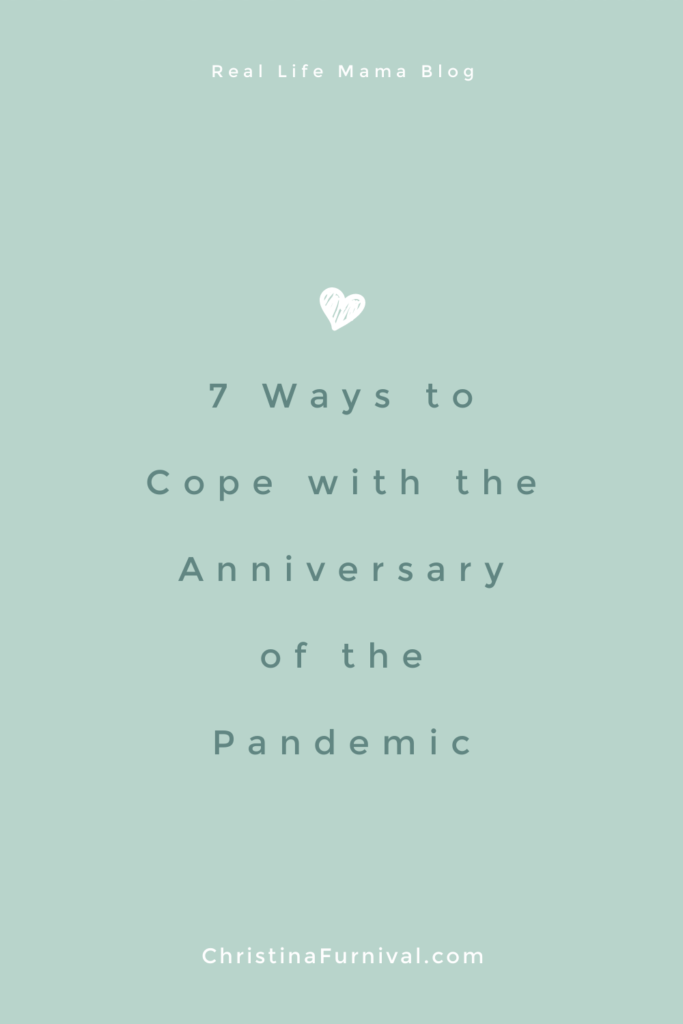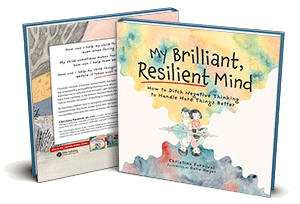Hi there! I’m Christina, a mom of two littles, a licensed mental health therapist, and a soon-to-be children’s book author! Thanks for checking out my site. Look around! I’m sure there’s something here for you! Read on to learn more about how to make sense of the first year anniversary of pandemic life.
The 1st Anniversary of the Lockdowns and Waves of the Pandemic
“How has it been a year already?”
“Also, how has it not been five years?”
“When will this all end?”
As we approach the year anniversary of living in pandemic times, I hear both these questions asked with frequency by clients and friends/family.
On the one hand, it feels like we’ve been stuck in a temporal anomaly where time has frozen, where daily life has stood still. On the other hand, it feels like so much has changed that it couldn’t all fit in to just one year.
We have gone through a sudden and unnerving upheaval with long-term life changes. We have been told to live within the parameters of guidelines, rules and regulations. What at first seemed like it might last two weeks, maybe a month, heck maybe even two, has turned into 12 incredibly long and arduous months without a definitive end in sight.
Often the anniversaries of an unhappy event bring their own version of grief. This anniversary is no different.
The Pandemic and its Upcoming Anniversary – You’re Uniquely Affected
What adds to the challenge of adjusting to your current life state is that your experience is not the same as everyone else’s.
As much as we are “all together” in this, many of us feel emotionally stranded. While we are in a “collective trauma”, each of our traumas are varied.
How the pandemic has affected each our home lives, work lives, and family lives is unique. And how we deal with the anniversary of the pandemic will be unique as well.
So how do we make sense of this anti-climactic occasion? One way is to allow ourselves to grieve.
It is Healthy to Grieve our Losses
Merriam-Webster defines grief as a “deep and poignant distress” and to grieve as “to feel or show grief”. I want you to know that when you have grief, it is healthy and healing to feel it and make sense of it, or grieve.
The Dual-Process Model of Grief says that as we process our grief we have periods of loss-oriented coping and restoration-oriented coping, and that bouncing between the two of them is part of the process.
Loss-oriented means we lean into the pain. We think about it, feel it, and cry about it.
Restoration-oriented means we turn our attentions away from the grief and figure out what living with grief in the background looks like. We get up, go to the home “office” for work, we homeschool the kids.
Both ways of handling the stress and sadness of the last year are healthy. So whether you’re finding yourself overcome with emotion, or you’re distressed but focused on other tasks, you’re doing a good job!
7 Ways We can Cope with the Anniversary of the Pandemic
Here are some suggestions for what you can start to do or continue to do to help you process the year marker of pandemic life.
1. Take Care of Yourself
One of the first places to start when you’re grieving is to make sure you are taking care of your basic needs.
Assess your nutrition and sleep habits, and make sure you’re getting in some movement to support yourself with nature feel-good hormone production.
2. Feel
One of the best ways we can strip the power from our uncomfortable emotions is to label them. And in order to do that, we need to identify they exist in the first place. We can only do that by allowing ourselves to feel.
We often push away feelings we don’t enjoy because it feels safe. But the irony is that ignoring or stuffing down our feelings makes them fester and grow. And when that happens they pop up in inconvenient times and ways.
If you’re feeling extra irritable, anger, apathetic, tired, etc., there’s a high chance that underneath those feelings are more vulnerable ones like sadness and fear that you haven’t processed yet.
3. Express — Talk and Journal
If you’ve been keeping it all in for a year, of course you feel like you’re about to explode!
Speak with your safest friends and family, the ones who listen well and whom you don’t feel judged by. Commiserate, relate, remember times passed and loved ones lost. During such an isolating time, we need connection more than ever.
That said, we don’t all have someone to talk to. And even if we do, writing in a journal is a great supplement.
Writing enables us to engage in meta thinking (thinking about our thoughts). When we put words on paper, we can observe them from a distance with perspective.
Write down what’s happening for you: your thoughts, feelings, experiences. Research has shown that the more we narrate our stories, including writing them down for ourselves, the better we are able to understand, organize, and process them healthfully.
4. Identify what you have control over
When our world feels chaotic, we feel like we are caught in the swirling and disorienting grip of a twister. There is a lot we cannot control with the pandemic, but in our daily lives there is a lot we do have control over. Focusing on what we can control can be so helpful. Make a list of what you DO have control over and put it up where you will see it.
Your may list actions you have control over such as how much news or media you consume, who you connect with, and what safe activities you engage in. You can also list the control you have over your thoughts, such as your mindset, looking for the silver linings, and engaging in meditation and gratitude practice.
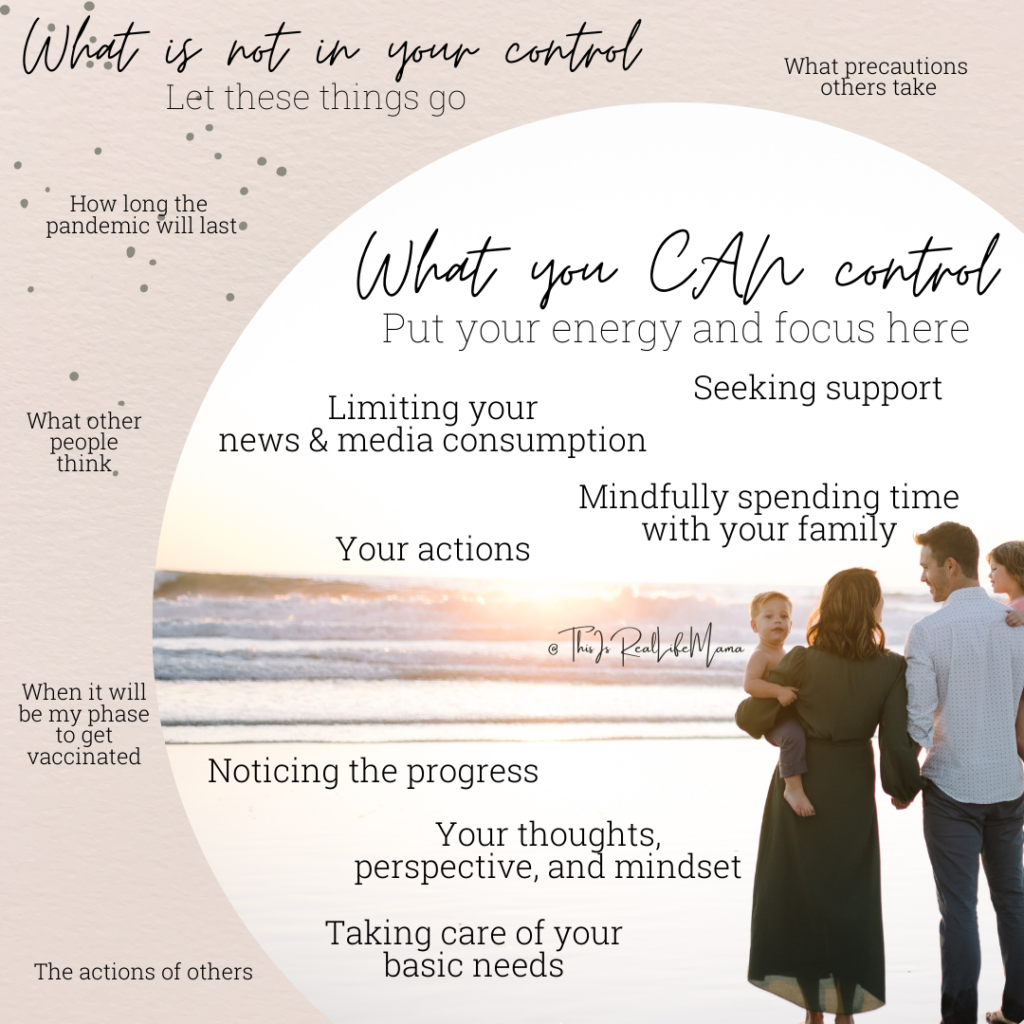
5. Remind Yourself of Your Strength and Resilience
The reality is, this all sucks. And you know what? You’ve made it this far.
You are so resilient and you are incredibly adaptable.
You’ve adjusted to the shock of the isolation of lockdowns by figuring out how to connect digitally. You’ve figured out how to maneuver in the face of devastation by focusing on the simple joys in your life. You may have had to face living life without a loved one by your side.
Remind yourself of your power, capability, and resilience. You have overcome a lot, and you can handle whatever comes your way.
6. Give yourself compassion
While you are stronger than you knew, you also deserve time and space to rest and feel and slow down.
We often tack guilt on top of other emotions we are feeling. Are you doing this? Unless the guilt is serving you to make a positive change, it is probably not doing you any good. You have my permission to let that guilt go.
I want you to give yourself grace and compassion. Allow yourself to be human during a ridiculously traumatic and taxing time.
7. Seek a virtual support group and telehealth therapy
Because of lockdowns, many businesses have developed services that can be accessed online, including mental health therapy and support groups! As we approach the anniversary of the pandemic, now is a great time to seek support.
I am a therapist with MDLIVE. There are many, many other virtual therapy providers now, including TalkSpace and BetterHelp and 7Cups. Many therapists have turned their own practices into telehealth as well.
Aside from the occasional tech issue, telehealth therapy is an easy and more accessible way for anyone to receive support! The beauty of no commute, no office to wait in, and no awkward interactions with other clients is pretty spectacular!
If you’re wondering how to pay for services, see if your work offers an EAP (Employee Assistance Program). With an EAP you are allowed several complimentary therapy sessions. You can also check with your insurance to see if they will cover your appointments. Additionally, you can private pay (often prices are offered on an income-based sliding-scale).
Resources:
Virtual Support Groups:
- Zoom virtual Parent Support Through COVID-19 group
- A Virtual Support Group to “provide a safe space for adults to discuss stressors relevant to current difficulties with psychosocial stressors such as cultural, economical, financial, interpersonal, and psychological.”
- A support group for those who lost a spouse: Soaring Spirits. They aim to create “a safe place for you to begin the process of rebuilding. We won’t pretend this is easy, and we won’t put a timeline on your process. We provide you with a huge group of people who are making their way through their own loss, and who are willing to walk beside you through yours. Also we will assure you that a full and happy life is still possible for you. Really.”
- Dinner Party is “a worldwide community of 20- and 30-somethings who have each experienced the loss of a parent, partner, child, sibling, other close family member, or close friend.”
- Support Group Central has a variety of COVID-related support groups to choose from.
My articles:
PsychologyToday is a great resource for finding a therapist who specializes in whatever you need.
National Suicide Hotline: 1-800-273-8255
If you are having thoughts of suicide, please seek help. The world is better with you in it and we want you here.

